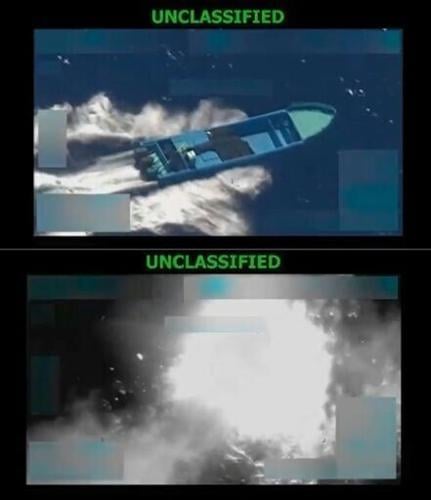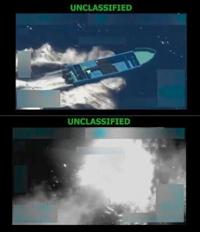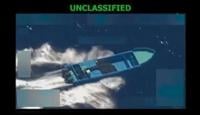A new US strike on an alleged drug-smuggling boat killed two people, Defense Secretary Pete Hegseth said Wednesday, announcing Washington's first such attack on a vessel in the Pacific Ocean.
The strike -- which Hegseth announced in a post on X alongside a video of a boat being engulfed in flames -- brings the total number to at least eight, with at least 34 people dead.
"There were two narco-terrorists aboard the vessel during the strike, which was conducted in international waters. Both terrorists were killed and no US forces were harmed in this strike," Hegseth said of Tuesday's action in the eastern Pacific.
"Just as Al-Qaeda waged war on our homeland, these cartels are waging war on our border and our people. There will be no refuge or forgiveness -- only justice," he wrote.
President Donald Trump's administration has said in a notice to Congress that the United States is engaged in "armed conflict" with Latin American drug cartels, describing them as terrorist groups as part of its justification for the strikes.
"The president determined these cartels are non-state armed groups, designated them as terrorist organizations, and determined that their actions constitute an armed attack against the United States," said the notice from the Pentagon, which also described suspected smugglers as "unlawful combatants."
But Washington has not released evidence to support its assertion that the targets of its strikes are drug smugglers, and experts say the summary killings are illegal even if they target confirmed narcotics traffickers.
- Regional tensions -
There were survivors of a US strike for the first time last week, but Washington chose to repatriate them rather than put them on trial for their alleged crimes.
Ecuador released one after finding no evidence that he had committed a crime, while authorities in Colombia said the other -- who "arrived with brain trauma, sedated, drugged, breathing with a ventilator" -- would face prosecution.
The US military campaign -- which has seen Washington deploy stealth warplanes and Navy ships as part of what it says are counter-narcotics efforts -- has fueled tensions with countries in the region.
This is especially the case with Venezuela, where the buildup of US forces has sparked fears that the ultimate goal is the overthrow of President Nicolas Maduro, whom Washington accuses of heading a drug cartel.
The United States has not specified the origin of the vessels it has targeted -- seven boats and one semi-submersible -- but has said that some were destroyed off the coast of Venezuela in international waters.
Meanwhile, a public feud between Trump and Colombia's leftist leader Gustavo Petro intensified in recent weeks over the Republican president's deadly anti-drug campaign.
Trump on Sunday vowed to end all aid to the South American nation -- a historically close US partner and the world's leading cocaine producer -- and branded Petro, who has accused the US president of murder, as an "illegal drug dealer."
Colombia on Monday recalled its ambassador to the United States, but Petro met with the top US diplomat in his country the following day to discuss counter-narcotics efforts, with Bogota's foreign ministry saying the two sides "reaffirmed the commitment of both parties to improve drug fighting strategies."
wd/ksb






